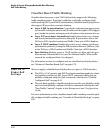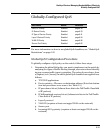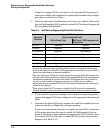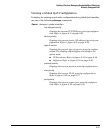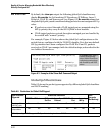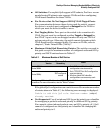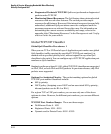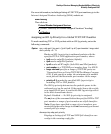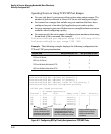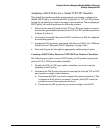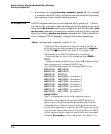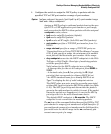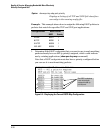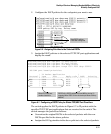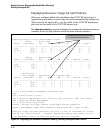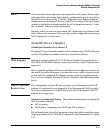
Quality of Service: Managing Bandwidth More Effectively
Globally-Configured QoS
Operating Notes on Using TCP/UDP Port Ranges
■ You can only have 6 concurrent policies when using unique ranges. The
number of policies allowed is lower if ACLs are also using port ranges.
■ You cannot have ranges that include any port numbers that have been
configured as part of another QoS application port number policy.
■ An error message is generated if there are not enough hardware resources
available when configuring a policy.
■ You must specify the entire range of configured port numbers when using
the no form of the command, for example:
ProCurve(config)# qos udp-port range 1300 1399 dscp 001110
ProCurve(config)# no qos range 1300 1399
Example. The following example displays the following configuration for
TCP and UDP port prioritization:
TCP/UDP Port 802.1p Priority for TCP 802.1p Priority for UDP
TCP Port 23 (Telnet)
7 7
UDP Port 23 (Telnet)
7 7
TCP Port 80 (World Wide Web HTTP)
2 2
UDP Port 80 (World Wide Web HTTP)
1 1
ProCurve(config)# qos tcp-port 23 priority 7
ProCurve(config)# qos tcp-port 80 priority 2
ProCurve(config)# qos udp-port 23 priority 7
ProCurve(config)# qos udp-port 80 priority 1
ProCurve(config)# qos udp-port range 100 199 priority 3
ProCurve(config)# show qos tcp-udp-port-priority
TCP/UDP port based priorities
| IP Packet Application |
Protocol | Type Port Apply rule | DSCP Priority
-------- + --------- ----------- ---------- + ------ -----------
TCP | IPV4 23 Priority | 7
TCP | IPV4 80 Priority | 2
UDP | IPV4 23 Priority | 7
UDP | IPV4 80 Priority | 1
UDP | IPV4 100-199 Priority | 3
Values in these two
columns define the QoS
classifiers used to select
the packets to prioritize.
Indicates that 802.1p priority
assignments are in use for
packets with 23, 80 or 100-199
as a TCP or UDP port number.
Displays the 802.1p priority
assignment for packets
with the indicated QoS
classifiers.
Figure 6-4. Configuring 802.1p Priority Assignments on TCP/UDP Ports
6-26



